- Home
- Steven Brust
Agyar
Agyar Read online
Table of Contents
Title Page
ACKNOWLEDGMENTS
PROLOGUE
ONE
TWO
THREE
FOUR
FIVE
SIX
SEVEN
EIGHT
NINE
TEN
ELEVEN
TWELVE
THIRTEEN
FOURTEEN
FIFTEEN
SIXTEEN
SEVENTEEN
EPILOGUE
Also by
Copyright Page
For Will and Emma
And the stuff we make of dreams
ACKNOWLEDGMENTS
I would like to offer my sincere thanks to the following people:
Dr. Flash Gordon and Betsy Pucci for medical assistance and information.
Maria Pinkstaff, for advice on ritual magic.
Emma Bull, Kara Dalkey, Pamela Dean, Will Shetterly, and David Dyer-Bennet for much helpful criticism.
Terri Windling for editing.
Lt. Ed Nuquist of the Minneapolis Police Department, for help with police procedure.
Neil Gaiman, my Evil Twin, for showing me that beauty can lie in places I’d never thought to look for it.
And my brother-in-law, Tom, for starting it all by talking about Dickens when it was much too late at night for such things.
PROLOGUE
I feel the need to write something more before I go on my way, something that can go on top of this pile of papers, and the last shall be first, as someone or other said in a different context.
It has been several days since I’ve been up in this little room, and in that time spring has come on with a vengeance. There’s a little joke for you, lover. But I don’t feel much like laughing. Since I was here last, I read this—what? What shall I call it? Collection of typed pages, I suppose. I read it, and it did to me what I hadn’t thought could be done any more.
For the love of love, how many changes can take place in a person before it all becomes meaningless and there is nothing left but a sort of numbness? Is that where I am now? No. Just the opposite; it is more like pins and needles of the soul.
Hmmm. Not bad. Do you like that turn of phrase, lover?
Lover.
There is something ironic in the way I’ve been using that word, and that isn’t right. There is irony aplenty, but not there, and in writing to myself, and to you, I ought not to hide behind the pretense.
I don’t know why reading these papers has made such a difference, unless it’s just that I hadn’t known before what you were thinking and feeling all this time. I knew what you did; I didn’t know why, and that seems to matter, though it flies in the face of reason. Even a few days ago, when I was last in this room, I thought all of these emotions were dead, and now they are in my face, coexisting with a hungerlike pain.
But that, I suppose, is the answer. I cannot deny the hunger; I will not deny the feelings, either. Does it really matter what you feel when you do something? Does it somehow make a difference if you’re sorry when you go blasting your way over someone’s life like a locomotive over a papier-mâché doll?
How about that one, my love?
Yes, I think it does matter. We do what we have to do, and if we learn regret, than that, too, matters, or so I now believe. I will take these papers with me, and I will also take those poems that are sitting in my room below, and I will leave, as planned, and live, as planned, and read this again. Maybe I’ll arrange it all nice and neat, divide it into chapters, and put quotes from Shakespeare or something in front of each, and send it off somewhere. Perhaps if I read it again I will understand it a little better, although, come to that, I didn’t enjoy reading it the first time; it reminded me more than anything of looking into a mirror when I was fifteen and bothered by acne.
Maybe that’s it; maybe I have acne in my soul.
I shouldn’t joke about it, because it really isn’t funny. I saw myself, and I didn’t like what I saw. Can I do anything about it?
I know that you did.
Everything has melted, and spring, with her warm breeze slipping through the boards over the window, has created her own metaphor; that of tears from the melting heart. Two days ago I could not have written that with a straight face, and now I cannot bring myself to laugh, and that is your fault. Did you know what you were doing when you put this here for me to read?
I asked if I could change, and now, twenty minutes later, the question seems absurd. I am changing whether I wish to or not.
As did you, my love, and I know whose fault that was.
May is the month of growth, of flowering, so now is as good a time as any to begin.
ONE
na·ture n 1. The intrinsic characteristics and qualities of a person or thing. 2. The order, disposition, and essence of all entities composing the physical universe.
AMERICAN HERITAGE DICTIONARY
jfjfjfjfjfjfjfjfjjKDKDKDKDKDKDKDTHE quick
brown fox;;;;;
= 234567890-*)(’&—%$#“+
It seems to be working. Jim mentioned that there was an old typewriting machine in one of the upstairs bedrooms, and I can’t resist trying it out. It seems to have been built in the 1930’s by Royal, and it’s amazing how well it works.
This is oddly enjoyable. What should I type?
When I was very young, I thought perhaps I would be a journalist, so I taught this skill to myself, and that first paragraph was enough to convince me that it is still there. I might enjoy sitting here from time to time and putting marks on paper, if I had anything to talk about. To be a journalist, I think, means to have an eye and a memory for detail. Yet my own memory is sufficiently idiosyncratic that I wonder if I would ever have been capable of creating a coherent article, even had my life gone in that direction. The things I remember seem to come in odd gasps, with a picture here, an emotion there, neither in order of importance nor in order chronological, except for the most recent of events.
I recall, for example, from the Christmas party last week, how Mrs. Lockwitt’s earring dangled against her neck and reflected light from a fixture of four frosted sixty-watt bulbs. This image is very clear, but things from even a few weeks ago are dim, in that I remember they happened, but could not supply the details.
I remember that Mrs. Lockwitt was saying something to me, but not looking at me as she spoke. I think she said, “There’s something foreign about the way you speak,” and then turned so that she was facing me. I took the opportunity to observe: slightly round, late forties, heavily powdered. She wore something peach colored that might have looked all right if we weren’t in a room where everything was blond wood. I couldn’t decide from her remark if she was beginning a conversational gambit or snubbing me, so I gave a brief tight-lipped smile of the sort Miss Manners would have approved of and didn’t say anything. She—Mrs. Lockwitt, not Miss Manners—turned back to studying Professor Carpenter’s library, filled as it was with books, oak furniture, and academicians in several flavors.
She said, “Have you been around here long?”
I started to say yes, reconsidered, reconsidered again, and said, “A few weeks. Maybe longer or shorter, depending upon what you mean by around here.”
There were thirty-five or forty graduate students and instructors in the house, about half in the library, the others divided between the living room where Miles Davis’s Sketches of Spain was on the stereo and the kitchen where smoking was allowed. Three or four young students were studying the professor’s collection of books, the others were all talking with each other about the breakup of the Eastern Bloc or the imminence of war, or telling jokes that you had to be a third-year student of German literature to understand.
“But you are with the college?” said Mrs. Lockwitt
.
I caught her eye, held it, and said, “You don’t look like an academic.”
“Oh, I’m not,” she said, blushing just a little. She was, as I knew already, the professor’s lover, and had probably paid for a third of the books in this room, as well as the bust of Voltaire and the Degas that was really very fine work for a print. Carpenter, head of the Modern Languages Department, was a bent stick of a bloodless Englishman, and I wondered how often the two of them had sex, and what it was like. You never know; maybe they made the walls rattle.
I was thinking about leaving. The boring but rather pretty girl named, hmm, whatever her name was, who had invited me to the party had already left, and, more important, I had confirmed what she’d told me—the professor owned a house not far from there which had never been rented. The girl (was it Rachel? Rebecca? something like that) had been trying to convince me of the existence of spirits, and claimed that the house was demon-infested, which is how the subject had come up.
Whether it was or not, I had already pumped Mrs. Lockwitt for the location, and she had confirmed that it was deserted, apparently because she had convinced “Arthur” to move in with her. She said nothing about demons. I don’t happen to believe in demons, so I wasn’t surprised. I had found what I wanted, though, and was ready to leave. I took a last look around.
Near the door a tall, serious-looking young man wearing a dark sweater and tan knit slacks was engaged in premating rituals with a long-necked beauty in a tight, slinky black dress that came down to her knees and was held up by straps. It wasn’t all that flattering, as it made her neck seem even longer, almost deformed. I looked at Mrs. Lockwitt’s earring once more, but she didn’t seem inclined to continue the conversation. She helped herself from the punch bowl and offered me some. Who puts punch bowls in the library? In any case, I knew what had gone into it, so I declined, excused myself with a gesture, and headed for the probable lovers-to-be.
“ … several generations,” he was saying. “All in the same family.”
“So you think it’s genetic?” she said, sounding more interested than she probably was. “It doesn’t surprise me. There are whole families of artists and musicians, why shouldn’t mathematics be the same way?”
“Exactly. We’re planning a project now with preschoolers, testing their aptitudes and relating it to their parents’ aptitudes. We’re working on a grant proposal with Timson in Biology.”
“It sounds exciting,” she said, as if trying to convince herself it was. “How far along—” She stopped because I had arrived. They looked at me, holding back their smiles a bit, the way one does with strangers who interrupt a conversation or a mutual seduction. He was half a head taller than I was, and broader; not at all matching the stereotype for people who talk about such things. She was almost my height, but more attractive than I am.
“I don’t believe we’ve met before,” I said, shifting my eyes to include them both. “John Agyar. Jack, if you like.”
They looked at each other quickly, not knowing how to deal with the interruption. As the silence was becoming uncomfortable, he loosened up a little and said, “Don Swaggart.”
“Jill Quarrier.”
I looked at her and performed a frown of recognition. “The artist?”
You could practically see her thaw. “You know my work?” I haven’t always been good at guesswork, but I’ve learned.
“I’ve never had the pleasure of seeing any; but you’ve been spoken of in very complimentary terms.”
“Really? By whom?”
I warmed to her a little; most people would have said “who.” “Several people around the department. I don’t recall any names, but I was certainly intrigued by what I heard. Do you happen to have anything with you?”
“Yes, do you?” said Young Don, no doubt feeling her attention slip away.
“I’m afraid not,” she said, either pleased, disappointed, or both. I couldn’t imagine what sort of artist she would be—her face had no animation whatsoever. That was all right; it wasn’t her face I was interested in.
“Is your work on display at the college?”
“Not at the moment. I have a few pieces at the studio in Berkshire West.”
“I’d love to see them.”
Donald shifted uncomfortably, probably trying to think of something to say other than “so would I.” He settled for asking me, “What department are you with?”
I laughed without showing teeth. “What would you guess?”
She said, “Most people here are Modern Languages, but I’d have guessed you for Drama.”
“Really? I think I’m flattered.”
Young Don said, “I’d have guessed Business.”
I caught his eye and said, “No, I’m afraid not. And you’re Sociology.”
He frowned. “Good guess.”
“No guess,” I said. “You fit the profile.”
He was wise enough not to ask, but she seemed stung on his behalf and said, “Why is everyone down on sociology? I think the study of how people live together is fascinating.”
“People are down on sociology,” I said, “because it was invented by people who felt someone ought to answer Marx, and there’s no answer for Marx outside of religion, a field any civilized person ought to avoid.”
“That’s preposterous—” he began.
“What is?”
“Your contention about sociology.”
“Oh. I thought you meant my contention about religion.”
“What makes you think—”
“Who first popularized the term?”
“Sociology? It was coined by Comte—”
“Who popularized it?”
“I suppose it was Herbert Spencer.”
“And what did he say about Marx?”
“Huh? Almost nothing, as a matter of fact.”
“And what was the strange thing the dog did in the nighttime?”
Jill laughed, which was half the battle won, and Young Don sputtered, which was the other half. “I don’t think you can conclude—”
“Read any Max Weber?” I said.
“Some.”
“Well?”
“Are you a Marxist?” He probably thought it was a good counterattack, but I couldn’t help laughing, both at the question and at his predicament.
“Not likely,” I said. “Merely a student of applied realities. And a lover of art. And a cardplayer.”
Donny frowned as the conversation went completely out of his reckoning. “You’re a gambler?”
“Not when I can help it,” I said. “You?”
“Uh, no.”
It was time to bring Jill back into it. “How about you?”
She gave the question more consideration than it was worth; probably the overintellectual type. “Sometimes,” she said. “Gambling can be exciting.”
“Winning is better, if you know how.”
“You know how?” she said, trying to act a little amused.
“Yes.”
“Tell me.”
“Show me your paintings, and I’ll let you in on the secret.”
“Sure,” she said, laughing. “When?”
“Now,” I said. “Unless you’re finding the party too exciting to slip away from.”
“You have wheels?”
“No, I have feet. It’s a lovely night, and Berkshire isn’t far.”
“It’s cold.”
“Not too cold; there’s no wind.”
She looked up at me through squinted eyes. Her brows were fair and I saw the faint blond roots of her dark hair. Amusing. Our eyes locked for a moment, and I thought I detected a sense of humor down there somewhere, as if she knew what was was happening and thought it was funny. Maybe she thought she was gambling. In any case, Young Don was forgotten. “All right,” she said. We went to the hallway, where I helped her with her parka of some synthetic material. My coat was the authentic English bobby’s coat; very natty. Stylish. We left together, while Donald was carefully looking
in another direction.
The night was the cold of Midwestern mid-winter with a big moon, a day shy of full, but mostly hidden by high, fast clouds. There were few streetlights. No one was out, save a howling dog a block away, an owl who darted from tree to tree in a vain search for winter rodents, three rats whom the owl didn’t notice, and one dark gray cat who kept appearing, staring at us, then vanishing behind the houses. The rats smelled like the sewers they lived in; I was pleased when we were past them. Eventually the cat left us alone, at around the same time the dog stopped howling. Either the dog’s master had shut it up, or the cat had killed it. Fine either way.
I offered her my arm and she took it. “What’s the secret, Jack?” she said.
“Always keep a few important cards where no one can see them.”
“That’s it? Cheat?”
“You call that cheating?”
“Don’t you?”
“Where do you live?”
“Off-campus housing. On Fullbright. A big, white house with blue lights coming out of the attic.”
“Do you live in the attic?”
“No. Are you really a gambler?”
“As I said, not when I can help it.”
“All right, then, a cardplayer?”
“I enjoy card games.”
“For money?”
“Sometimes.”
“Is that how you make your living?”
I laughed at that, but didn’t explain why. Her touch on my arm sent the message that she might be getting annoyed, but by then we were practically at Berkshire. She had a key so she opened the door and went inside. I studied the mid-nineteenth century archway. She said, “What are you waiting for?”
“I’m trying to figure out whose work this is.”
“Oh. You’re into architecture?”
“Not really,” I said.
She looked puzzled and held the door open for me. I entered, and she led me down to the studio to show me her etchings. Finis.
I stopped typing a few hours ago, took the last page out of the machine, and set it facedown on the pile to my left, as if I had finished and wouldn’t resume. I’ve spent the intervening time sitting here, staring into space. I suppose I might as well keep typing.

 Phoenix
Phoenix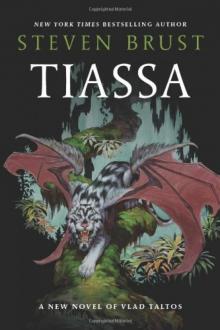 Tiassa
Tiassa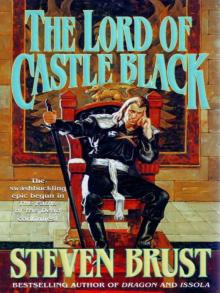 The Lord of Castle Black
The Lord of Castle Black To Reign in Hell: A Novel
To Reign in Hell: A Novel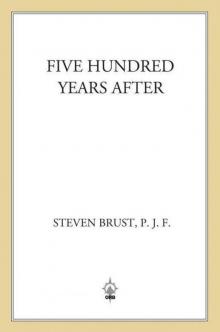 Five Hundred Years After (Phoenix Guards)
Five Hundred Years After (Phoenix Guards)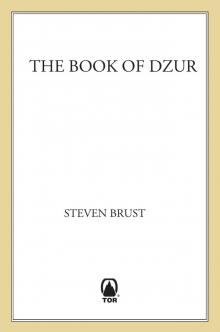 The Book of Dzur: Dzur ; Jhegaala
The Book of Dzur: Dzur ; Jhegaala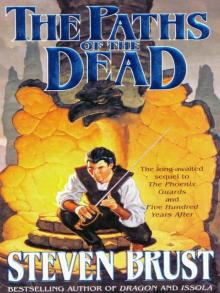 The Paths of the Dead
The Paths of the Dead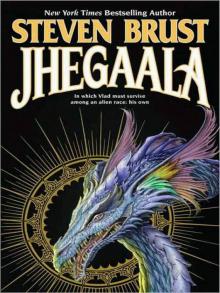 Jhegaala
Jhegaala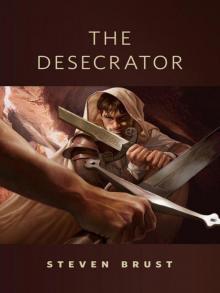 The Desecrator: A Tor.com Original
The Desecrator: A Tor.com Original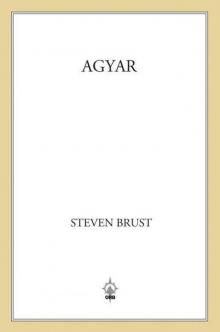 Agyar
Agyar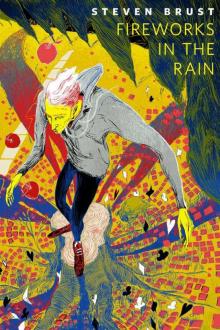 Fireworks in the Rain
Fireworks in the Rain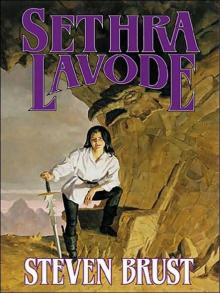 Sethra Lavode
Sethra Lavode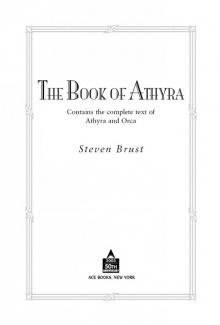 The Book of Athyra
The Book of Athyra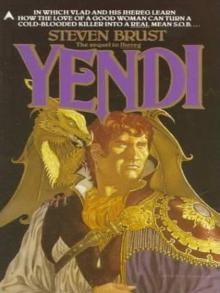 Yendi
Yendi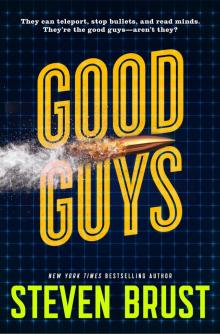 Good Guys
Good Guys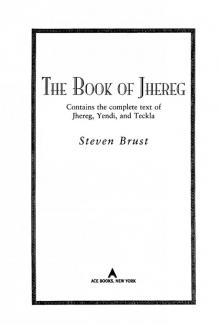 The Book of Jhereg
The Book of Jhereg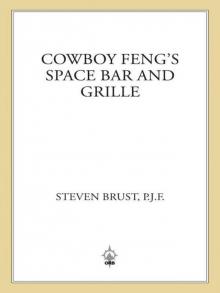 Cowboy Feng's Space Bar and Grille
Cowboy Feng's Space Bar and Grille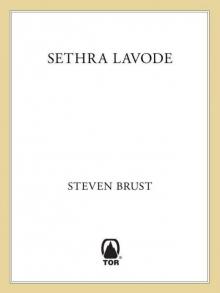 Sethra Lavode (Viscount of Adrilankha)
Sethra Lavode (Viscount of Adrilankha) My Own Kind of Freedom
My Own Kind of Freedom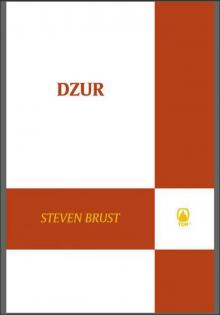 Dzur (Vlad Taltos)
Dzur (Vlad Taltos) The Lord of Castle Black: Book Two of the Viscount of Adrilankha
The Lord of Castle Black: Book Two of the Viscount of Adrilankha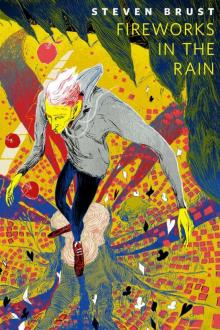 Fireworks in the Rain: A Tor.Com Original
Fireworks in the Rain: A Tor.Com Original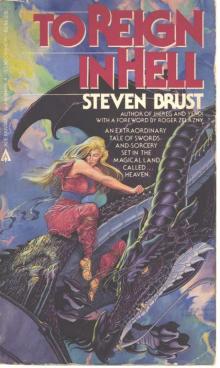 To Reign In Hell
To Reign In Hell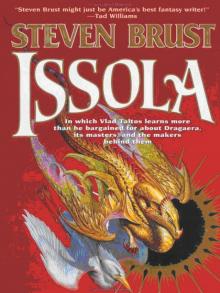 Issola
Issola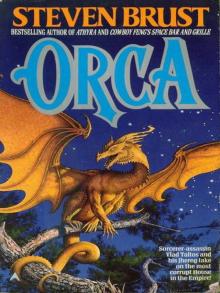 Orca
Orca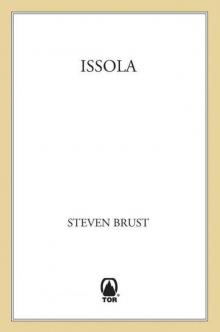 Issola (Vlad Taltos)
Issola (Vlad Taltos)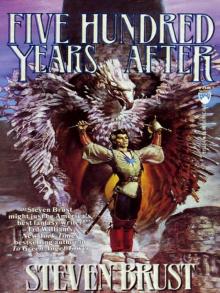 Five Hundred Years After
Five Hundred Years After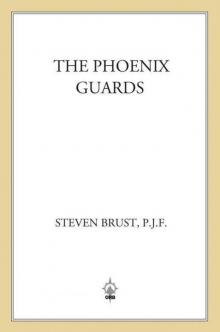 The Phoenix Guards
The Phoenix Guards Taltos
Taltos![[Vlad Taltos 06] Athyra Read online](http://i1.bookreadfree.com/i1/03/24/[vlad_taltos_06]_athyra_preview.jpg) [Vlad Taltos 06] Athyra
[Vlad Taltos 06] Athyra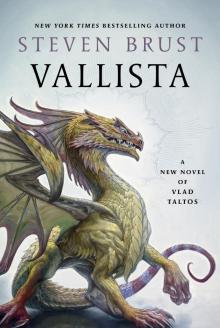 Vallista--A Novel of Vlad Taltos
Vallista--A Novel of Vlad Taltos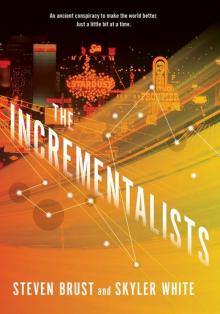 The Incrementalists
The Incrementalists![[Vlad Taltos 04] Taltos Read online](http://i1.bookreadfree.com/i/03/24/[vlad_taltos_04]_taltos_preview.jpg) [Vlad Taltos 04] Taltos
[Vlad Taltos 04] Taltos![[Vlad Taltos 03] Teckla (v 1.1) Read online](http://i1.bookreadfree.com/i1/03/27/[vlad_taltos_03]_teckla_v_1_1_preview.jpg) [Vlad Taltos 03] Teckla (v 1.1)
[Vlad Taltos 03] Teckla (v 1.1) The Book of Taltos
The Book of Taltos The Paths of the Dead (Viscount of Adrilankha)
The Paths of the Dead (Viscount of Adrilankha)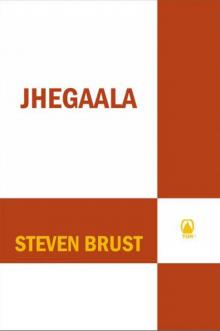 Jhegaala (Vlad Taltos)
Jhegaala (Vlad Taltos)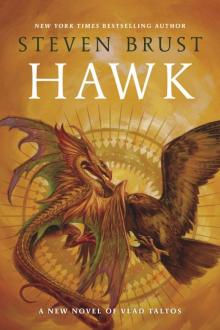 Hawk (Vlad)
Hawk (Vlad)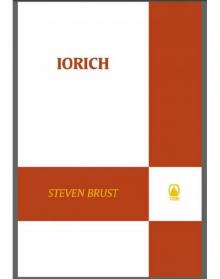 Iorich
Iorich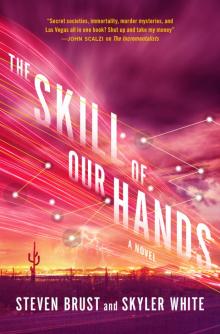 The Skill of Our Hands--A Novel
The Skill of Our Hands--A Novel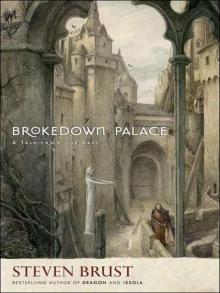 Brokedown Palace
Brokedown Palace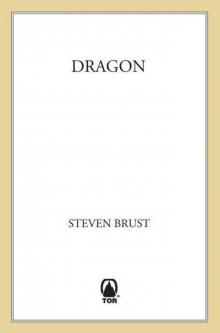 Dragon (Vlad Taltos)
Dragon (Vlad Taltos) Dragon
Dragon Athyra
Athyra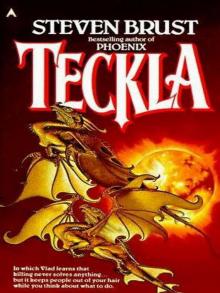 Teckla
Teckla Dzur
Dzur